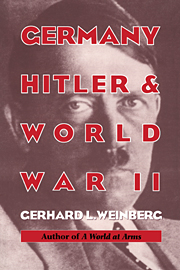Book contents
- Frontmatter
- Contents
- Preface
- Introduction
- Part I Background
- Part II The Nazi system
- Part III Background for war
- Part IV World War II
- 12 German diplomacy toward the Soviet Union
- 13 The Nazi–Soviet pacts of 1939: A half century later
- 14 From confrontation to cooperation: Germany and the United States, 1917–1949
- 15 Pearl Harbor: The German perspective
- 16 Global conflict: The interaction between the European and Pacific theaters of war in World War II
- 17 The “Final Solution” and the war in 1943
- 18 July 20, 1944: The German resistance to Hitler
- 19 D-Day after fifty years: Assessments of costs and benefits
- 20 German plans for victory, 1944–1945
- 21 Reflections on running a war: Hitler, Churchill, Stalin, Roosevelt, Tojo
- 22 Some thoughts on World War II
- 23 A new Germany in a new world
- Appendix: the end of Ranke's history? Reflections on the fate of history in the twentieth century
- Index
13 - The Nazi–Soviet pacts of 1939: A half century later
Published online by Cambridge University Press: 05 August 2012
- Frontmatter
- Contents
- Preface
- Introduction
- Part I Background
- Part II The Nazi system
- Part III Background for war
- Part IV World War II
- 12 German diplomacy toward the Soviet Union
- 13 The Nazi–Soviet pacts of 1939: A half century later
- 14 From confrontation to cooperation: Germany and the United States, 1917–1949
- 15 Pearl Harbor: The German perspective
- 16 Global conflict: The interaction between the European and Pacific theaters of war in World War II
- 17 The “Final Solution” and the war in 1943
- 18 July 20, 1944: The German resistance to Hitler
- 19 D-Day after fifty years: Assessments of costs and benefits
- 20 German plans for victory, 1944–1945
- 21 Reflections on running a war: Hitler, Churchill, Stalin, Roosevelt, Tojo
- 22 Some thoughts on World War II
- 23 A new Germany in a new world
- Appendix: the end of Ranke's history? Reflections on the fate of history in the twentieth century
- Index
Summary
Early on August 22, 1939, the world was startled to learn from an announcement in the Soviet press that German Foreign Minister Joachim von Ribbentrop would arrive in Moscow on the following day to sign a nonaggression pact. Equipped with instructions from Adolf Hitler authorizing him to sign both a treaty and secret protocol which would enter into force as soon as signed (rather than when ratified later), von Ribbentrop left for Moscow that evening. At the airport, the German delegation was met by Deputy Commissar for Foreign Affairs, Vladimir P. Potemkin, who had earlier that year declined an invitation to meet with British Foreign Secretary Lord Halifax.
In the Kremlin, there were several conversations between von Ribbentrop and other German diplomats, Josef Stalin, and Vyacheslav Molotov, the Commissar for Foreign Affairs. During the night of August 23–24, agreement was reached on all points, the pact and a secret protocol were signed; and there followed a celebration party in which the participants drank toasts to each other, to German–Soviet friendship, and to the absent Adolf Hitler.
The pact, which was published, provided that neither country would attack the other or assist any third power at war with the other, thereby assuring each of the neutrality of the other party if it should decide to attack anyone else. They promised not to join in groups of powers directed against the other and to settle by peaceful means all differences that might arise between themselves. The pact was to last for ten years and an additional five unless notice of termination were given a year before its expiration. The treaty was to enter into effect immediately.
- Type
- Chapter
- Information
- Germany, Hitler, and World War IIEssays in Modern German and World History, pp. 168 - 181Publisher: Cambridge University PressPrint publication year: 1995



